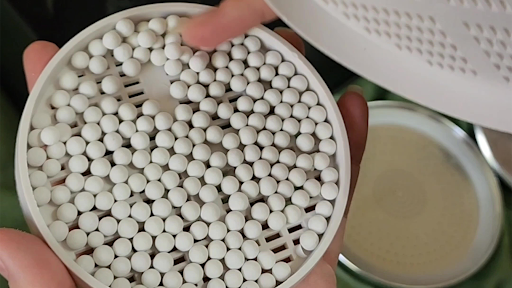
600k+ Followers

600k+ Likes

160k+ Followers
FEATURED IN





It might seem like a small detail but the kind of water that flows through your shower every day can have a huge impact on your skin, hair and overall health. As we become more conscious about what we eat, drink, and apply to our skin, it makes perfect sense to look closely at what we bathe in. This is where Shower Envy's filtration system—particularly its use of ceramic stones—comes into play. Let’s explore how these tiny powerhouses are making a big difference in modern shower technology.
What Makes Shower Water Quality Important?
Whether you live in a city with treated water or a rural area with a well, the water in your home can contain chlorine, heavy metals, sediments and microorganisms that negatively impact your health. Over time, these contaminants can cause dry skin, brittle hair and even irritation for sensitive skin types. That’s why filtered shower heads, like those offered by Shower Envy, have become an essential bathroom upgrade for many households.
Overview of Shower Envy’s Filtration System
Shower Envy’s advanced system is more than just a shower head for hard water—it’s a complete water transformation tool. The design integrates multi-stage filtration, including ceramic stone water filters, vitamin C infusion, and high-pressure technology.
Their Filtered Shower Head Plus Vitamin-Infused Water is one of the most popular models thanks to its combined wellness and tech-forward benefits.
Understanding Ceramic Stones in Water Filtration
What Are Ceramic Stones?
Ceramic stones are small, porous balls made from naturally occurring materials like tourmaline, clay, and minerals. These stones are heated to high temperatures, creating a structure that can trap impurities and neutralize harmful substances.
How Do They Compare to Other Filtration Media?
Unlike charcoal filters, which focus primarily on chemical adsorption, ceramic stones use a mechanical filtration process. They allow water to pass while catching sediments, bacteria, and even some viruses. When paired with KDF and activated carbon, they create a holistic filtration solution.
The Science Behind Ceramic Stone Filtration
How Ceramic Stones Remove Impurities
The surface of a ceramic stone water filter acts like a sponge. It captures large particles, microorganisms, and even traces of heavy metals. Thanks to their microporous structure, they’re incredibly efficient at filtering out contaminants without removing beneficial minerals.
Key Minerals and Contaminants They Target
Ceramic stones primarily target:
-
Chlorine
-
Lead and mercury
-
Bacteria and cysts
-
Rust and sediments
They also help maintain an ideal pH level, which is essential for skin and hair health.
Benefits of Ceramic Stones in Shower Envy’s System
Superior Chlorine & Heavy Metal Removal
Ceramic stones are especially effective at reducing chlorine, a harsh chemical added to municipal water to kill bacteria. Prolonged exposure to chlorine can lead to skin irritation and hair discoloration, particularly for people with color-treated hair.
pH Balancing for Skin and Hair
One standout feature of Shower Envy’s ceramic stones is their ability to balance water pH, creating a more skin-friendly shower system. Balanced pH reduces frizz, itchiness, and dryness, making every shower a soothing, spa-like experience.
Longevity and Low Maintenance
Ceramic stones are incredibly durable. They can last several months before needing replacement and don’t require electricity or fancy attachments. Learn more about filter care in our blog on the benefits of using filtered shower heads.

How Ceramic Stones Enhance Your Shower Experience
Softer, Healthier Skin
Contaminants in unfiltered water can strip your skin of natural oils. Ceramic filtration reduces these impurities, helping skin stay hydrated and balanced.
Shinier, Stronger Hair
Many users notice improved shine and reduced breakage after switching to Shower Envy’s filters. With fewer chemicals in the water, your scalp stays healthier and hair products work better.
Reduced Irritation for Sensitive Skin
People with eczema, psoriasis, or sensitive skin report significant relief when using a pH-balancing shower filter. Ceramic stones ensure water feels softer and gentler.
Comparing Ceramic Stones to Other Filtration Methods
Ceramic stones vs. charcoal filters
Activated charcoal is excellent at removing chlorine and organic compounds but doesn’t filter out bacteria or larger sediments. Ceramic stones complement charcoal filters, making them ideal for a multi-layered system like Shower Envy’s.
Ceramic vs. KDF Filters
KDF filters are known for their heavy metal removal. However, they perform best at higher water pressures and temperatures. Ceramic stones work effectively across a range of household setups and add the benefit of bacterial reduction.
Why Shower Envy Chose Ceramic Stones
Shower Envy’s focus is on long-term wellness, not just convenience. By incorporating ceramic filtration technology, they ensure you get the most out of your shower without extra effort. Their 3-in-1 Bundle: ShowerEnvy, Hose, Holder & Refills provides all the essentials to start experiencing the difference immediately.

Maintenance and Care for Ceramic Stone Filters
How Often to Replace Them
While ceramic stones are long-lasting, they typically need replacing every 4–6 months depending on your water quality and usage. If your water has a lot of visible sediment, check your stones monthly.
Cleaning and Regeneration Tips
To clean your ceramic stones:
-
Soak them in white vinegar for a few hours
-
Rinse thoroughly with clean water
-
Let them dry completely before reuse
This process removes surface buildup and helps extend filter life.
For a closer look at how Shower Envy’s technology protects your well-being, read our post on shower head health risks and solutions.
Conclusion
When it comes to water filtration, not all solutions are created equal. Ceramic stone water filters offer a unique combination of durability, chemical reduction, and skin-friendly performance. Shower Envy integrates these stones into a thoughtfully designed system that benefits your entire body—from scalp to toes. If you're looking for a shower head that’s good for your skin and hair, explore the full collection at ShowerEnvy and make the switch to a cleaner, more luxurious shower.
FAQs
1. How often should I replace ceramic stones in my shower filter?
Typically, every 4 to 6 months is a good rule of thumb. But if you live in an area with very hard water or notice a drop in water quality (like a smell or buildup), it’s smart to replace them sooner. Think of it like changing a sponge—it only works as long as it’s clean and absorbent.
2. Do ceramic stones remove bacteria from shower water?
Yes, to an extent. Ceramic stones have a microporous surface that physically traps bacteria, protozoa, and larger cysts. While they’re not a full substitute for UV or chemical disinfection in drinking water, they’re great at improving the cleanliness and feel of your shower water.
3. Can ceramic filters reduce limescale buildup?
They sure can. Ceramic stones help filter out calcium and magnesium, which are the main culprits behind that annoying white crust on your tiles and shower glass. This means fewer scrubbing sessions—and better water for your skin and hair.
4. Are ceramic stone filters safe for well water?
Absolutely. In fact, ceramic filters are especially helpful for well water, which can contain sediment, rust, and organic material. They help make well water gentler on your body and safer to shower in.
5. Why does my ceramic filter change color over time?
Great question—and no, it’s not going bad. That color change means it’s doing its job. The filter is actively trapping impurities like dirt, rust, and contaminants. When it starts to look heavily discolored, that’s your cue to clean or replace it.



